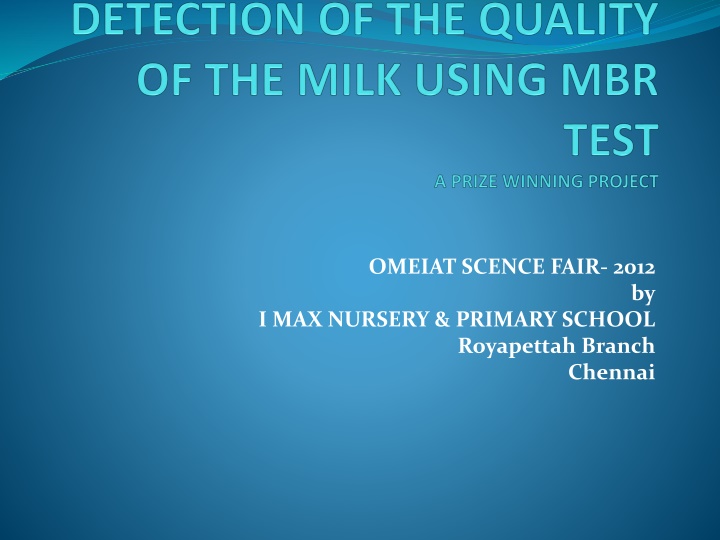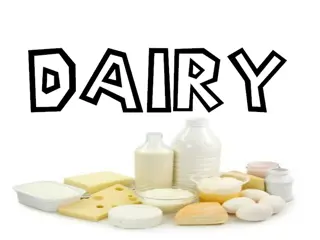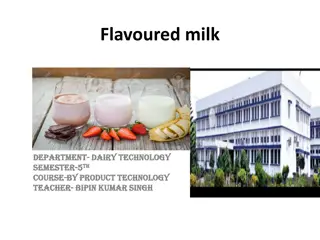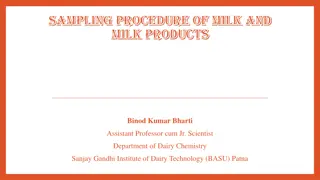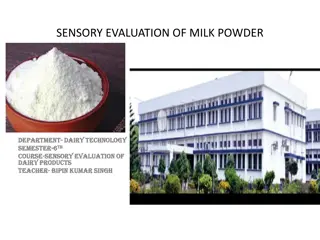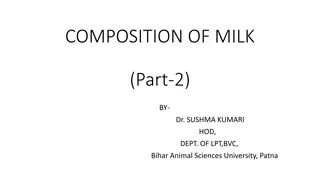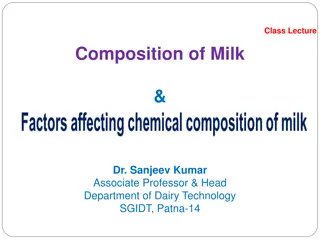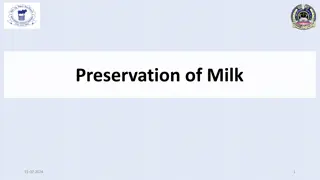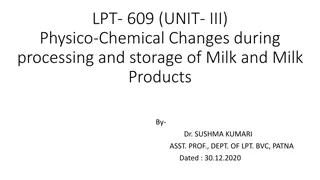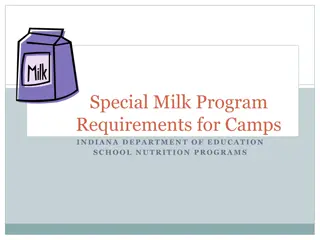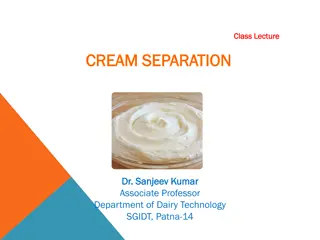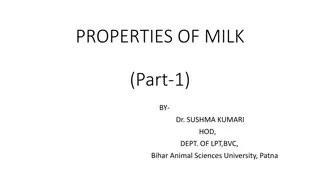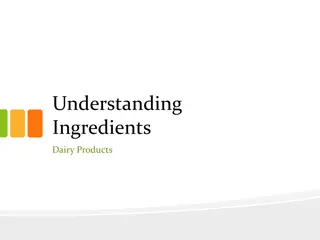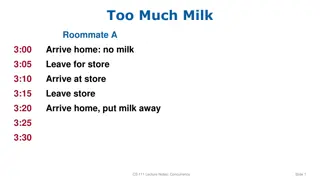Methylene Blue Reduction Test for Milk Quality Assessment
The Methylene Blue Reduction (MBR) test is utilized to assess the quality of milk based on the reduction of color imparted by a dye. The disappearance of color indicates the presence of bacteria in milk. This test involves adding methylene blue dye to milk samples, observing the color change, and measuring the time taken for reduction as an indicator of bacterial content. Factors affecting the test include temperature, oxygen levels, organism types, and dye concentration. The test apparatus includes test tubes, a pipette, and a water bath.
Download Presentation

Please find below an Image/Link to download the presentation.
The content on the website is provided AS IS for your information and personal use only. It may not be sold, licensed, or shared on other websites without obtaining consent from the author.If you encounter any issues during the download, it is possible that the publisher has removed the file from their server.
You are allowed to download the files provided on this website for personal or commercial use, subject to the condition that they are used lawfully. All files are the property of their respective owners.
The content on the website is provided AS IS for your information and personal use only. It may not be sold, licensed, or shared on other websites without obtaining consent from the author.
E N D
Presentation Transcript
OMEIAT SCENCE FAIR- 2012 by I MAX NURSERY & PRIMARY SCHOOL Royapettah Branch Chennai
Principle: The methylene blue reduction test is based on the fact that the color imparted to milk by the addition of a dye such as methylene blue will disappear more or less quickly. The removal of the oxygen from milk & the formation of reducing substances during bacterial metabolism causes the color to disappear. Oxygen is consumed by the bacteria The greater the number of bacteria in milk, the quicker will the oxygen be consumed, & in turn the sooner will the color disappear. Thus the time of reduction is taken as a measure of the number of organism in milk
Formulation of Hypothesis: MBR test shall be used to detect the quality of the milk.
Materials and Method: Samples: a) Sample 1-Aawin Milk b) Sample 2-Ealumalai Milk c) Sample 3-Tirumala Milk d) Sample 4-Appu Milk
Procedure: 1 .0 g of methylene blue dye was dissolved in 250ml of distilled water. Four different types of milk packets were selected for the experiment. 10ml from each type was taken in the test tube. 1 .0 ml of methylene blue dye was added to all the samples. The color change was noted. Test tubes were closed with cork. Samples were kept on a water bath at 37 degree Celsius. Temperature was maintained using low flame candle. The color change from pale blue to milky white was noted down. Experiment was repeated to get concordant values
Apparatus The necessary equipment consists of test tubes with rubber stoppers, a pipette or dipper graduated to deliver 10 ml of milk and a water bath for maintaining the samples at 35o to 37oC. The bath is protected from light during the incubation period. PREPARATION OF METHYLENE BLUE SOLUTION : The solution is prepared by boiling 200 ml of distilled water in a brown stoppered flask and then adding one methylene blue tablet to the flask of hot water and stirring to dissolve completely under hot condition. The solution may be stored in the stoppered brown flask to protect from light
Factors Affecting the Test. Many factors affect the methylene blue reduction test Cold milk holds more oxygen than warm milk; Pouring milk back and forth from one container to another increases the amount, At milking time much oxygen may be absorbed The kind of organisms affect the rate of reduction. Light hastens reduction and therefore the tests should be kept covered. The concentration of the dye should be uniform as an increased concentration lengthens the time of reduction. Increasing the incubation temperature augments the activity of the bacteria and therefore shortens the reduction time.
Advantages of the Methylene Blue Test:- All apparatus are simple. Anybody can do the test Large samples are taken, thus eliminating many sources of error. In expensive equipments Applied for grading the quality of milk More accurate method
SAMPLES: Sample 1. Aawin Milk green color Sample 2. Aawin Milk orange color Sample 3. Aawin Milk blue color Sample 4. Ealumalai Milk Sample 5. Thirumala Milk Sample 6. Appu Milk Sample 7. Jersy Milk Sample 8. Raw Milk Sample 9. Arokya Milk Sample 10. Heritage Milk Sample 11. Dodla diary Milk blue color Sample 12. Dodla diary Milk black color Sample 13. Fresh Milk
Table 1. Time of color change 7:00 Sl. Types of milk Quantity Ml 10 Initial time 3:30 Duration Quality grade. J 1. Aavin milk green color Aavin milk orange color Aavin milk blue color Ealumalai milk 3hr:30min 2. 10 11:45 12:45 1hr:00min N 3. 10 11:45 5:25 5hr:40min D 4. 10 3:30 8:20 4hr:50min F 5. Thirumala milk 10 3:30 9:15 5hr:45min C 6. Appu milk 10 3:30 10:05 6hr:35min A 7. Jersy milk 10 11:45 4:43 4hr:58min E 8. 9. Raw milk Arokya milk 10 10 10:04 10:54 1:45 2:49 3hr:41min 4hr:45min I G 10. 11. Heritage milk Dodla diary milk blue color Dodla diary milk black color Fresh milk Mother diary milk 10 10 10:04 10:04 2:07 3:50 4hr:3min 5hr:46min H B 12. 10 10:07 1:01 2hr:54min M 13. 14. 10 10 10:07 10:07 1:35 1:25 3hr:28min 3hr:18min K L
Table 2. Quantity Ml Time of color change Sl. Types of milk Initial time Duration Quality grade. 1. Aavin milk green color Aavin milk orange color Aavin milk blue color Ealumalai milk 10 3:30 7:05 3hr:35min J 2. 10 11:45 12:54 1hr:09min N 3. 10 11:45 5:37 5hr:52min D 4. 10 3:30 8:25 4hr:55min F 5. 6. Thirumala milk Appu milk 10 10 3:30 3:30 9:15 10:10 5hr:55min 6hr:40min C A 7. 8. 9. 10. 11. Jersy milk Raw milk Arokya milk Heritage milk Dodla diary milk blue color Dodla diary milk black color Fresh milk Mother diary milk 10 10 10 10 10 11:45 10:04 10:04 10:04 10:04 4:52 1:48 2:56 2:10 4:00 5hr:07min 3hr:44min 4hr:52min 4hr:6min 3hr:56min E I G H B 12. 10 10:07 1:07 3hrs:00min M 13. 14. 10 10 10:07 10:07 1:40 1:29 3hr:33min 3hr:22min K L
Conclusion: According to the experiment made with 14 samples we find that most of the milks are comparatively worse in quality. And the quality of APPU brand milk will be the best in nature.
Pictorial representation of experiment: Test tube with milk sample
Milk samples: Thirumala Milk
